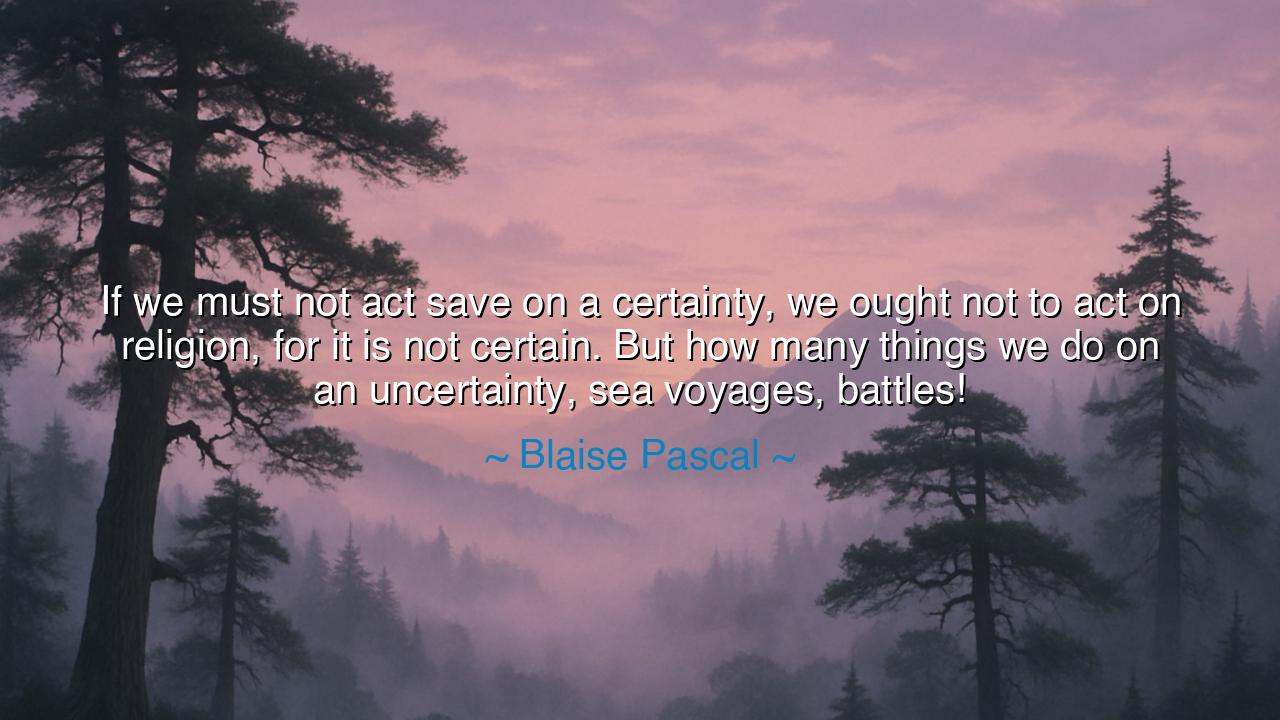
If we must not act save on a certainty, we ought not to act on
If we must not act save on a certainty, we ought not to act on religion, for it is not certain. But how many things we do on an uncertainty, sea voyages, battles!






In the quiet contemplation of existence, where the human spirit grapples with the mysteries of faith and reason, the words of Blaise Pascal resound with profound insight: "If we must not act save on a certainty, we ought not to act on religion, for it is not certain. But how many things we do on an uncertainty, sea voyages, battles!" This statement reflects the eternal tension between the certainty of reason and the uncertainty of faith, a tension that has plagued human thought for millennia. Pascal, a man deeply steeped in both the sciences and philosophy, recognizes the inherent uncertainty that governs human actions. He points out that if we waited for certainty in all things before we acted, we would be paralyzed, for much of life—whether in war, in sea voyages, or even in the small decisions we make daily—requires us to take leaps of faith, grounded not in complete certainty, but in trust and hope.
Pascal’s challenge is a call to recognize the paradox of faith itself. Religion, in his view, cannot be reduced to the solid ground of empirical certainty, nor should it be dismissed because of its elusive nature. Religion is not a science that can be verified with experiments, nor a philosophy that can be proven by logical reasoning alone. And yet, despite the absence of absolute certainty, religion plays a central role in human life. We are drawn to it, not by certainty, but by the desire for meaning, for purpose, and for connection with something larger than ourselves. Pascal’s wager, which urges belief in God as a rational bet on eternal happiness, invites us to act in the face of uncertainty, just as we act in the face of uncertainty in so many other areas of life.
Consider the ancient Greeks, whose philosophers wrestled with the balance between certainty and uncertainty in matters of faith and knowledge. Socrates, the great seeker of truth, famously declared that he knew nothing, yet his life was an embodiment of action driven by his belief in the importance of moral virtue and the search for knowledge. Though Socrates could not claim certainty about the existence of the divine or the ultimate nature of reality, his faith in truth and the pursuit of wisdom led him to act with unwavering conviction. Like Pascal, Socrates understood that certainty in life was often a mirage, and that to act in the world, to shape one’s life and character, was to live with the humility of not knowing all, but still choosing to move forward.
Think of the legendary explorers of history, those who ventured into unknown lands, propelled not by certainty, but by the hope of discovery. One such example is Christopher Columbus, who set sail into the uncharted waters of the Atlantic, uncertain of what lay ahead. He did not have the certainty of a map leading to the New World, yet he took the risk, driven by the belief that something valuable lay beyond the horizon. Columbus’s journey mirrors Pascal’s insight: we make many decisions in life, not based on certainty, but on hope, faith, and a vision of what might be. To explore, to seek, and to act, even in the face of uncertainty, is a fundamental part of the human experience.
The lesson in Pascal’s words is profound: life itself is an act of faith, an act of living amidst uncertainty. Whether in our beliefs, our endeavors, or our decisions, we are often guided not by complete certainty, but by conviction and trust. Just as Pascal calls out the irrationality of waiting for absolute certainty before acting in religion, so too must we recognize that in every decision we make, there is an element of the unknown. War, travel, and even the act of loving require us to step into the unknown, to trust, to move forward, even when the outcome is uncertain.
In our own lives, let us not be paralyzed by the pursuit of certainty, but instead act with courage and conviction in the face of uncertainty. The greatest moments in human history—the leaps into new frontiers of knowledge, the fight for justice, the journeys of exploration—were all taken by individuals who acted not in the safety of complete knowledge, but in the hope of what could be achieved. In the same way, our faith is not based on the need for proof or absolute certainty, but on the trust that the pursuit of meaning, love, and justice is worth embarking on, even in the face of life’s inevitable uncertainties.
Let us, then, live as Pascal advised, embracing the uncertainty of life with faith and action. Let us acknowledge that in every moment, whether in matters of religion, love, or pursuit, there is uncertainty, and yet we must still choose to act. For it is in the act of faith—in moving forward in the face of the unknown—that we create meaning and shape our destiny.






AAdministratorAdministrator
Welcome, honored guests. Please leave a comment, we will respond soon